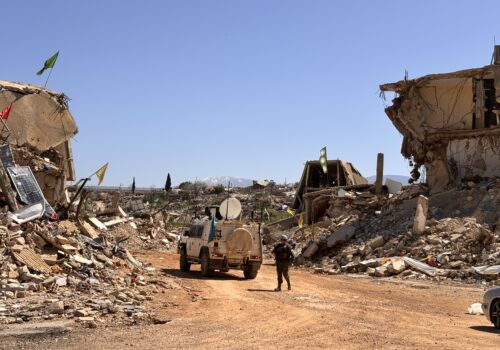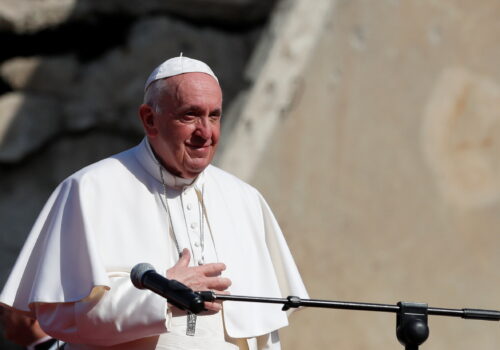Gazans fear famine amid Israel aid block: ‘I don’t want to be a number’
Humanitarian aid into Gaza is being blocked by a democratically elected nation state, Israel, and is fully supported by the world’s self-declared greatest democracy, the United States. Indeed, the imagery and stories coming from the Palestinian enclave leave one feeling like we exist in the realm of the inhumane absurd.
For more than two months now, nothing has entered Gaza. Not a single grain of rice or bag of flour. The only thing standing between Gaza’s 2.2 million starving people on the brink of famine and three thousand trucks packed with humanitarian aid is Israel.
“It’s a humanitarian catastrophe. Catastrophe on the true meaning of the world. We never could have ever imagined this.”
The voice note comes from one of the social workers assisting with the International Aid Network for Relief and Assistance, my non-profit organization that works in Gaza.
“We had been distributing rice, a serving of rice just to try to ease the hunger in the bellies of the children at the camps we work in,” she continues.
“But we had to stop now because there’s no rice left.”
I am not disclosing the names of those quoted, due to safety concerns in the aftermath of Israel’s targeting of humanitarian aid workers. Although even with the precaution of anonymity, one colleague remarked: “Israel knows who we all are anyway.”
It has been more than two months since Israel broke the ceasefire deal, resumed its bombing campaign of Gaza, and declared that no aid would enter the Strip. Well before the October 7, 2023, Hamas attacks, Israel controlled everything that entered or exited Gaza, even at the Rafah crossing at its border with Egypt.
The Israeli cabinet has started deliberations on resuming aid operations but under a framework that would “by-pass Hamas”, which would perhaps make sense if Hamas controlled the aid, only it doesn’t.
I have been to Gaza four times since the launch of the war in Gaza, on humanitarian missions with INARA, and would have gone on my fifth mission in February had Israel not denied me entry. I am hardly the only one, there has in fact been a troubling increase in denials of humanitarians and medics on missions to Gaza over the last three months.
I have been to warehouses, out in the field on distributions, and in sector meetings. Israel has long maintained that humanitarian aid entering Gaza is “controlled by Hamas.” The humanitarian community has categorically stated over and over that Hamas does not control the aid, despite allegations that the militant group has stolen some of it. But it is worth noting that if Hamas has been stealing or hoarding aid, it’s not from humanitarian organizations’ warehouses or distribution points.
This framework and its mechanisms would see private security contractors, or the military, establish “Israeli hubs” for distribution. The United Nations Office for Coordination of Humanitarian Affairs (UNOCHA) issued a statement on behalf of all its partners slamming this plan.
“It is dangerous, driving civilians into militarized zones to collect rations, threatening lives, including those of humanitarian workers, while further entrenching forced displacement,” UNOCHA said in a statement.
“Humanitarian action responds to people’s needs, wherever they are.”
Most of us have set up distribution points close to the communities we serve, or, similar to our work at INARA, we deliver directly into the camps we work with. The population of Gaza is not mobile. Cars and buses don’t function; there is no fuel. People have to walk or take donkey carts to get anywhere. It’s not logical to expect someone to walk hours to get to a set distribution point in an active military zone and then haul an up to fifty-kilogram food parcel back to their tent.
Even assuming that someone was able to get the food box back to their tent, what are they supposed to cook with? Gaza has gone without cooking gas for months People try to gather wood, some are even burning books and trash to light a fire to cook on, but they are often unable to source enough. This is why functional community kitchens is so critical, but we have no idea how or if they will even be supplied.
But this is not a battle space that is ruled by logic. Equally ludicrous is Israel’s claim that “there is plenty of food in Gaza.”
There isn’t. The World Food Program does not state that its warehouses are empty, bakeries do not shut down, and children do not claw at scraps of food at the bottom of a pot when food is plentiful. What has been distributed to community kitchens will be depleted in the next few days.
It is no secret that Israel has weaponized humanitarian aid to ostensibly pressure Hamas, and the government itself has stated that it’s basically enforcing a “starve or surrender” policy.
Rule 53 of International Humanitarian Law specifically states, “The use of starvation of the civilian population as a method of warfare is prohibited.”
Israel is countering this by citing Article 23, which states that consignments may be prevented if there are concerns they may not reach their intended target or benefit the enemy. This is again based on the false premise that Hamas controls the aid. If this were the case, aid organizations like ours would have been unable to deliver assistance when Israel was permitting entry. We especially would not have been able to deliver during the ceasefire, when Hamas re-emerged onto Gaza’s streets.
SIGN UP FOR THIS WEEK IN THE MIDEAST NEWSLETTER
There already is an International Criminal Court warrant, issued back in November of last year, for Prime Minister Benjamin Netanyahu and Defense Minister Yoav Gallant, which includes among the alleged crimes “the war crime of starvation as a method of warfare.”
Last week, the International Court of Justice began its deliberations on Israel’s restrictions on aid and aid operations at the request of the UN General Assembly. The deliberations will likely take months. Israel boycotted the sessions and called the whole thing a “circus”.
Israel recently rejected a Hamas offer of a five-year deal that would see it cede political power, countering with a forty-five-day ceasefire proposal and the provision that Hamas agree to disarm, which Hamas in turn rejected.
While ceasefire talks sputter, Israel is doubling down. The government just approved a “conquest” plan to expand its operations in Gaza, calling up additional tens of thousands of reservists, and enraging the Israeli population, who are growing increasingly incensed with their government’s refusal to do what it takes to get back to a ceasefire that will see the remaining hostages released. Tens of thousands of Israelis have been demonstrating on a regular basis, demanding that their government not continue to endanger the hostages’ lives.
For Palestinians, time is running out— a warning that has been echoed at some of the highest ranks of international organizations, including the World Health Organization.
“We are breaking the bodies and minds of the children of Gaza. We are starving the children of Gaza. We are complicit,” Deputy Director General Michael Ryan told reporters at the WHO’s headquarters. “It’s an abomination .”
When I speak to Palestinians in Gaza, I hear the strain in their voices—the subtle tremors as they fight not to crack under mounting hunger after a year and a half of military bombardment.
“Arwa,” they say. “I don’t want to be a number.”
Arwa Damon is a nonresident senior fellow at the Atlantic Council’s Rafik Hariri Center for the Middle East and president and founder of the International Network for Aid, Relief, and Assistance (INARA), a nonprofit organization that focuses on building a network of logistical support and medical care to help children who need lifesaving or life-altering medical treatment in war-torn nations.
Further reading
Fri, May 9, 2025
Why Trump’s Middle East trip should set sights beyond business deals
MENASource By Daniel B. Shapiro
By all accounts, US President Donald Trump’s upcoming visit to the Gulf will not prioritize major diplomatic breakthroughs.
Tue, Apr 29, 2025
Dispatch from the UN Blue Line: Israel’s ‘systematic destruction’ in Lebanon
MENASource By Nicholas Blanford
If Hezbollah refuses to disarm, Israel would almost certainly escalate its attacks possibly to the extent of resuming the war in Lebanon.
Fri, Apr 25, 2025
Will Pope Francis’s Middle East legacy endure?
MENASource By Karim Mezran
The late Pope's final address on Easter Sunday was a capstone in a track record of advocacy for peace between the Israelis and Palestinians.
Image: A Palestinian woman carries five-year-old Osama Al-Reqep at Nasser Hospital, where receives treatment, in Khan Younis, in the southern Gaza Strip, April 30, 2025. REUTERS/Hatem Khaled TPX IMAGES OF THE DAY


